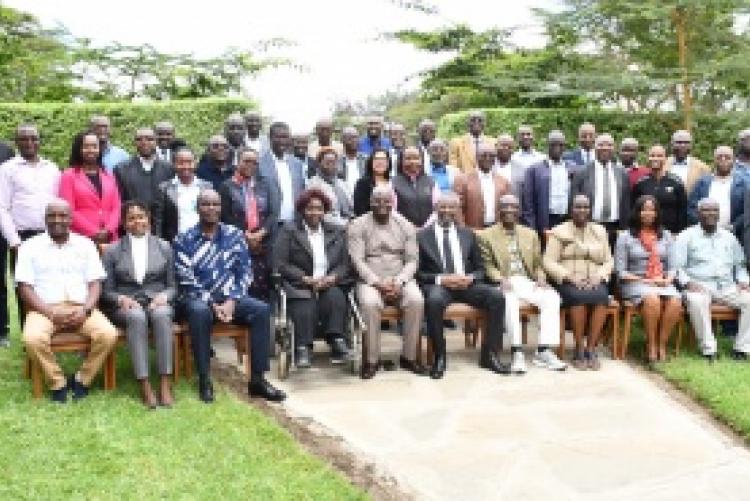In an inspiring address to the University strategic planning committee at Sawela Lodge in Naivasha, the Vice-Chancellor, Prof. Stephen Kiama's opening address set the tone for an invigorating and purposeful discussion, emphasizing the workshop's significance in shaping the future of the University. With a commitment to guiding the formulation of the new strategic plan for 2023-2028, the Vice-Chancellor presented ten pillars that would shape the university's transformative journey.
While expressing his enthusiasm for the strategic planning process, the Vice-Chancellor emphasized its significance in aligning efforts and resources toward strategic goals. He urged the committee to embrace disruptive thinking, urging them to explore innovative approaches while engaging stakeholders and leveraging data-driven insights.
The Vice Chancellor in recognizing the evolving landscape of higher education also emphasized the need for the University to metamorphosize into a new entity. He metaphorically described the university's current state as a "caterpillar stage of development" and stressed the importance of progressing toward the pupal and butterfly stages. " I am happy to be here to participate in the strategic planning process because it is a very important exercise. It is going to help us focus our efforts and resources towards the strategic goal". Said Prof. Kiama.
The VC also challenged the team to bring up new disruptive thinking into the strategic plan. Prof. Kiama proposed various key areas for consideration in the strategic plan, outlining the following priorities:
- Digitization: Embracing technological advancements to digitize university operations and services, enhancing efficiency and accessibility.
- Innovation Ecosystem: Fostering a vibrant innovation ecosystem that connects the university with the community, driving high-impact solutions to societal challenges while promoting job creation and revenue generation.
- Industry Partnership: Positioning the University of Nairobi as a problem solver and solution provider for industries, transcending traditional internships and attachments.
- Entrepreneurship: Equipping all students with entrepreneurial skills, enabling them to monetize their expertise and contribute to a disruptive business landscape. Encourage graduates to challenge conventional thinking and drive innovation.
- People: Cultivating a conducive teaching and learning environment, prioritizing student-centered and problem-based approaches to education.
- Sustainability: Ensuring the university's financial viability and sustainability by collaborating with the University of Nairobi Foundation and Alumni to generate significant resources. Embrace green and affordable energy solutions, engage in water conservation efforts, and foster a vibrant circular economy within the university.
- Research: Anchor research activities around specific thematic areas, involving both undergraduate and postgraduate students in impactful research endeavors.
- Corporate Social Responsibility (CSR): Concentrate efforts on addressing challenges within the city of Nairobi, collaborating with stakeholders to provide solutions and contribute to its regeneration through circular economy practices.
- University Services: Extend services to the community through initiatives such as a veterinary hospital, transforming the University of Nairobi health services into a public utility hospital. Revitalize the University Press to support research through academic publications, and identify opportunities for commercialization through UNES (University of Nairobi Enterprises and Services Limited).
This intensive workshop session aims to harness collective expertise and chart a course for the University's future growth and success.
- Log in to post comments

